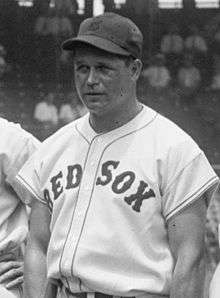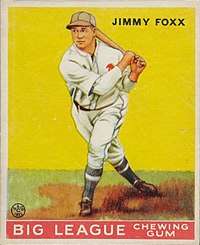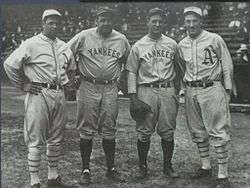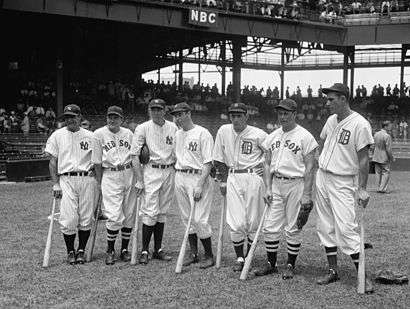Jimmie Foxx
James Emory Foxx (October 22, 1907 – July 21, 1967), nicknamed "Double X" and "The Beast", was an American professional baseball first baseman who played 20 seasons in Major League Baseball (MLB) for the Philadelphia Athletics, Boston Red Sox, Chicago Cubs, and Philadelphia Phillies.[1] His most productive years were with the Philadelphia Athletics and the Boston Red Sox, where he hit 30 or more home runs in 12 consecutive seasons and drove in more than 100 runs in 13 consecutive years.
| Jimmie Foxx | |||
|---|---|---|---|
 Foxx with the Boston Red Sox in 1937 | |||
| First baseman | |||
| Born: October 22, 1907 Sudlersville, Maryland | |||
| Died: July 21, 1967 (aged 59) Miami, Florida | |||
| |||
| MLB debut | |||
| May 1, 1925, for the Philadelphia Athletics | |||
| Last MLB appearance | |||
| September 23, 1945, for the Philadelphia Phillies | |||
| MLB statistics | |||
| Batting average | .325 | ||
| Hits | 2,646 | ||
| Home runs | 534 | ||
| Runs batted in | 1,922 | ||
| Teams | |||
| |||
| Career highlights and awards | |||
| |||
| Member of the National | |||
| Induction | 1951 | ||
| Vote | 79.2% (seventh ballot) | ||
Foxx became the second player in MLB history to hit 500 career home runs, attaining that plateau at age 32 years and 336 days. For many years he held the record for the youngest major leaguer to reach 500 home runs. His three career Most Valuable Player awards are tied for second all-time. Foxx was inducted into the National Baseball Hall of Fame in 1951.[2]
Early years
Foxx was born in Sudlersville, Maryland, on October 22, 1907, to Dell and Mattie Foxx, who were farmers. Dell Foxx had played baseball for a town team when he was younger. Jimmie Foxx did well in school but excelled in sports, particularly soccer, track, and baseball. He played all three sports at Sudlersville High School.
Foxx dropped out of high school early to join a minor league team managed by former Philadelphia Athletics great Frank "Home Run" Baker. Foxx had hoped to pitch or play third base, but since the team was short on catchers, Foxx moved behind the plate. He immediately drew interest from the Athletics and New York Yankees. Foxx signed with the A's and made his major league debut in May 1925 at age 17. He was still in his junior year of high school at the time.[3]
Major league career
Philadelphia Athletics

The A's catching duties were already filled by future Baseball Hall of Fame member Mickey Cochrane, so by 1927, Foxx was splitting time between catching, first base, and the outfield. In 1929, installed as the A's regular first baseman, Foxx had a breakthrough year, batting .354 and hitting 33 home runs. That year, Foxx appeared on the cover of Time.[4]
In 1932, Foxx hit .364, with 58 home runs with 169 RBIs, missing the Triple Crown by just three points in batting average. Foxx actually hit 60 home runs that year, which would have tied Babe Ruth's record, but two of the home runs were hit in games that ended up being rained out, so the home runs did not count. Boston Red Sox first baseman Dale Alexander hit .367, but in just 454 plate appearances; he would not have won the batting title under current rules, which are based upon 3.1 plate appearances per team games played. Foxx did win the Triple Crown the following season, with a batting average of .356, 163 RBIs, and 48 home runs. He won back-to-back MVP honors in 1932 and 1933.

Foxx was one of the three or four most feared sluggers of his era. The great Yankee pitcher Lefty Gomez once said of him, "He has muscles in his hair."
In 1937, Foxx hit a ball into the third deck of the left-field stands at Yankee Stadium, a very rare feat because of the distance and the angle of the stands. Gomez was the pitcher who gave it up, and when asked how far it went, he said, "I don't know, but I do know it took somebody 45 minutes to go up there and get it back."
When the Great Depression fully hit in the early 1930s, A's owner Connie Mack was unable to pay the salaries of his highly paid stars, and was obliged to sell off a number of them. After a 1936 contract dispute, Mack sold Foxx's contract to the Red Sox for $150,000 (equivalent to approximately $2,763,669 in 2019 dollars[5]).
Boston Red Sox

Foxx played six years for Boston, including a 1938 season in which he hit 50 home runs, drove in 175 runs, batted .349, won his third MVP award, and again narrowly missed winning the Triple Crown. Foxx is one of nine players to have won three MVPs; only Barry Bonds (7) has more.
On June 16, 1938, he set an American League record when he walked six times in a game. In 1939 he hit .360, his second-best all-time season batting average. His 50 home runs would remain the single-season record for the Red Sox until David Ortiz hit 54 in 2006.
Chicago Cubs and Philadelphia Phillies
Foxx's skills diminished significantly after 1941. Some sources attribute this to a drinking problem, while others attribute it to a sinus condition.
He split the 1942 season between the Red Sox and Chicago Cubs, playing mostly a reserve role. He sat out the 1943 season and appeared only in 15 games in 1944, mostly as a pinch hitter.
He wound up his career with the Philadelphia Phillies in 1945, filling in at first and third, pinch hitting, and pitching nine games, including two as the starting pitcher. He compiled a 1–0 record and 1.59 ERA over 222⁄3 innings. Foxx was often called the right-handed Babe Ruth, but his career was the opposite of Ruth in this regard. Ruth began his big-league career as a pitcher; Foxx ended his big-league career as one.
Foxx finished his 20-year career with 534 home runs, 1,922 runs batted in, 1,751 runs scored, 2,646 hits, 458 doubles, 125 triples, 1,452 bases on balls and a .325 batting average. His 12 consecutive seasons with 30 or more home runs was a major league record until it was broken by Barry Bonds in 2004. At the end of his career, his 534 home runs placed him second only to Ruth on the all-time list, and first among right-handed hitters. He retained these positions until Willie Mays passed Foxx for second place in 1966. Foxx was elected to the Baseball Hall of Fame in 1951.
Post-baseball career
Foxx worked as a minor league manager and coach after his playing days ended, including managing the Fort Wayne Daisies of the All-American Girls Professional Baseball League for one season in 1952.[6] He took them to the playoffs where they lost in the first round 2 games to 1 against the Rockford Peaches. Foxx did not return for the 1953 season.
Foxx served as head coach for the University of Miami baseball team for two seasons, going 9–8 in 1956 and 11–12 in 1957.
A series of bad investments left Foxx broke by 1958.[7] The Red Sox responded by naming Foxx hitting coach of their Triple-A affiliate, the Minneapolis Millers of the American Association, that season.[6] In the early 1960s he lived in Galesburg, Illinois where he was reduced to working as a greeter at a locally owned steak house. He eventually retired to suburban Cleveland in Lakewood, and was employed by the Lakewood Recreation Department. His two children, a daughter and son, also lived in Lakewood. His son, Jimmie Foxx, Jr., was an outstanding football player at Lakewood High School and at Kent State University.
Foxx had a city baseball field named in his honor. The dedication ceremony included Foxx's son, grandchildren and several former members of the Cleveland Indians, including Herb Score and Mike Hegan. TV announcer Casey Coleman, son of announcer Ken Coleman, served as master of ceremonies of the event. A plaque commemorating Foxx's community service remains there today.
Death
Foxx died in 1967 at age 59 in Miami, Florida.[8] He became ill while eating dinner with his brother and was taken to a hospital, where resuscitative efforts failed. An autopsy showed that Foxx had choked on a piece of food. The year before, Foxx's second wife, Dorothy, had also died of choking.[9] Foxx is buried at Flagler Memorial Park in Miami.
Legacy
.jpg)
A statue of Foxx was erected in his hometown of Sudlersville, Maryland, on October 25, 1997. In 1999, he ranked number 15 on The Sporting News' list of the 100 Greatest Baseball Players,[10] and was a nominee for the Major League Baseball All-Century Team.
Tom Hanks's character Jimmy Dugan in the movie A League of Their Own was largely based on Foxx and Hack Wilson, although the producers took a number of liberties in creating the role.[7]
Foxx is mentioned in the poem "Line-Up for Yesterday" by Ogden Nash:
—Ogden Nash, Sport magazine (January 1949)[11]
See also
- List of Major League Baseball home run records
- 500 home run club
- 50 home run club
- List of Major League Baseball runs batted in records
- List of Major League Baseball individual streaks
- List of Major League Baseball career home run leaders
- List of Major League Baseball career total bases leaders
- List of Major League Baseball career hits leaders
- List of Major League Baseball career batting average leaders
- List of Major League Baseball career on-base percentage leaders
- List of Major League Baseball career slugging percentage leaders
- List of Major League Baseball career runs scored leaders
- List of Major League Baseball career doubles leaders
- List of Major League Baseball career triples leaders
- List of Major League Baseball career extra base hits leaders
- List of Major League Baseball career total bases leaders
- List of Major League Baseball career OPS leaders
- List of Major League Baseball career runs batted in leaders
- List of Major League Baseball career bases on balls leaders
- List of Major League Baseball career putouts leaders
- Triple Crown
- List of Major League Baseball annual home run leaders
- List of Major League Baseball batting champions
- List of Major League Baseball annual runs batted in leaders
- List of Major League Baseball single-game hits leaders
- List of Major League Baseball players to hit for the cycle
- Boston Red Sox Hall of Fame
Notes and references
- "Jimmie Foxx Statistics and History | Baseball-Reference.com". Baseball-Reference.com. Retrieved 2016-01-14.
- "Jimmie Foxx". Baseball Hall of Fame. Retrieved 28 July 2012.
- "Jimmie Foxx". Baseball Hall of Fame. Retrieved 2016-01-14.
- "Jimmie Fox: July 29, 1929". Time. Retrieved August 20, 2013.
- Federal Reserve Bank of Minneapolis. "Consumer Price Index (estimate) 1800–". Retrieved January 1, 2020.
- "James E. Foxx AAGPBL Player/Profile".
- espn.com, Reel Life: 'A League of Their Own', accessed August 19, 2013.
- "Sarasota Herald-Tribune - Google News Archive Search". news.google.com.
- Edes, Gordon (September 12, 2006). "Foxx news channeling: Ortiz's run prompts a glance into history". Boston Globe. Retrieved July 21, 2012.
- "100 Greatest Baseball Players by The Sporting News : A Legendary List by Baseball Almanac". www.baseball-almanac.com.
- "Baseball Almanac". Retrieved 2008-01-23.
Further reading
- Bennett, John. "Jimmie Foxx". SABR.
- Nack, William (August 19, 1996). "Lost In History". Sports Illustrated.
From 1929 to 1931, the Philadelphia A's were the best team in baseball, with four future Hall of Famers and a lineup that dominated Babe Ruth's legendary Yankees. So why hasn't anyone heard of them?
External links
| Wikimedia Commons has media related to Jimmie Foxx. |
- Jimmie Foxx at the Baseball Hall of Fame
- Career statistics and player information from MLB, or ESPN, or Baseball-Reference, or Fangraphs, or Baseball-Reference (Minors), or Retrosheet
- Jimmie Foxx at SABR (Baseball BioProject)
- Jimmie Foxx at Baseball Almanac
- Jimmie Foxx at Baseball Library
- Jimmie Foxx at Hall of Stats
- Jimmie Foxx at The Deadball Era
- Jimmie Foxx at Find a Grave

| Achievements | ||
|---|---|---|
| Preceded by Ty Cobb |
American League Triple Crown 1933 |
Succeeded by Lou Gehrig |
| Preceded by Pinky Higgins |
Hitting for the cycle August 14, 1933 |
Succeeded by Earl Averill |
